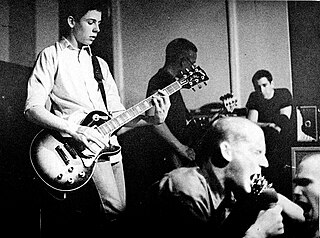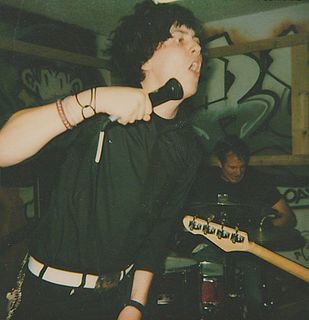Grindcore is an extreme fusion genre of heavy metal and hardcore punk that originated in the mid-1980s, drawing inspiration from abrasive-sounding musical styles, such as thrashcore, crust punk, hardcore punk, extreme metal, and industrial. Grindcore is considered a more noise-filled style of hardcore punk while using hardcore's trademark characteristics such as heavily distorted, down-tuned guitars, grinding overdriven bass, high-speed tempo, blast beats, and vocals which consist of growls and high-pitched shrieks. Early groups like Napalm Death are credited with laying the groundwork for the style. It is most prevalent today in North America and Europe, with popular contributors such as Brutal Truth and Nasum. Lyrical themes range from a primary focus on social and political concerns, to gory subject matter and black humor.

Hardcore punk is a punk rock music genre and subculture that originated in the late 1970s. It is generally faster, harder, and more aggressive than other forms of punk rock. Its roots can be traced to earlier punk scenes in San Francisco and Southern California which arose as a reaction against the still predominant hippie cultural climate of the time. It was also inspired by Washington D.C. and New York punk rock and early proto-punk. Hardcore punk generally disavows commercialism, the established music industry and "anything similar to the characteristics of mainstream rock" and often addresses social and political topics with "confrontational, politically-charged lyrics."
Gothic rock is a style of rock music that emerged from post-punk in the United Kingdom in the late 1970s. The first post-punk bands which shifted towards dark music with gothic overtones include Siouxsie and the Banshees, Joy Division, Bauhaus, and the Cure.

MxPx is an American pop punk band from Bremerton, Washington, founded in 1992 as Magnified Plaid. As of 2016, current members include Mike Herrera on lead vocals and bass guitar, Yuri Ruley on drums and percussion, Tom Wisniewski on lead guitar and backing vocals and Chris Adkins on rhythm guitar and backing vocals. The band's discography includes twelve studio albums, four EPs, four compilation albums, a live album, a VHS tape, a DVD and 20 singles. A number of the group's releases have charted on Billboard, including the Billboard 200 and No. 1 on Billboard Christian Albums.

The Descendents are an American punk rock band formed in 1977 in Manhattan Beach, California, by guitarist Frank Navetta, bassist Tony Lombardo and drummer Bill Stevenson. In 1979, they enlisted Stevenson's school friend Milo Aukerman as a singer, and reappeared as a punk rock band, becoming a major player in the hardcore punk scene developing in Los Angeles at the time. They have released eight studio albums, three live albums, three compilation albums, and four EPs. Since 1986, the band's lineup has consisted of singer Milo Aukerman, guitarist Stephen Egerton, bassist Karl Alvarez, and drummer Bill Stevenson.

Alkaline Trio is an American rock band from Chicago, Illinois. Since 2001, the band has consisted of Matt Skiba, Dan Andriano and Derek Grant.

Screamo is an aggressive subgenre of emo that emerged in the early 1990s, emphasizing "willfully experimental dissonance and dynamics". It was pioneered by San Diego bands Heroin and Antioch Arrow and developed in the late 1990s mainly by bands from the East Coast of the United States such as Orchid, Funeral Diner, Saetia, and Pg. 99. Screamo is strongly influenced by hardcore punk and characterized by the use of screamed vocals. Lyrical themes usually include emotional pain, death, romance, and human rights. The term "screamo" has been frequently mistaken as referring to any music with screaming vocals.
Crust punk is a form of music influenced by English punk rock and extreme metal. The style, which evolved in the early 1980s in England, often has songs with dark and pessimistic lyrics that linger on political and social ills. The term "crust" was coined by Hellbastard on their 1986 Ripper Crust demo.

Hüsker Dü was an American punk rock band formed in Saint Paul, Minnesota, in 1979. The band's continual members were guitarist/vocalist Bob Mould, bassist/vocalist Greg Norton, and drummer/vocalist Grant Hart. They first gained notability as a hardcore punk band, and later crossed over into alternative rock. Mould and Hart were the band's principal songwriters, with Hart's higher-pitched vocals and Mould's baritone taking the lead in alternating songs.
Metalcore is a fusion music genre that combines elements of extreme metal and hardcore punk. As with other styles blending metal and hardcore, such as crust punk and grindcore, metalcore is noted for its use of breakdowns, slow, intense passages conducive to moshing. Other defining instrumental qualities include heavy riffs and stop-start rhythm guitar playing, occasional blast beats, and double bass drumming. Vocalists in the genre typically use thrash or scream vocals. Some later metalcore bands combine this with clean singing, often during the chorus. Death growls and gang vocals are common. 1990s metalcore bands were inspired by hardcore while later metalcore bands were inspired by melodic death metal. Melodic death metal bands like At the Gates and In Flames influenced later metalcore bands.

Hatebreed is an American metalcore band from Bridgeport, Connecticut, formed in 1994. The band released its debut album Satisfaction is the Death of Desire in 1997, which gave the band a cult following. The band signed to Universal Records and released Perseverance in 2002, which hit the Billboard 200. Combining elements of hardcore and heavy metal, the band is often described as a metalcore, hardcore punk, and beatdown hardcore band. They have played a major role in the Connecticut hardcore scene.
Post-hardcore is a punk rock music genre that maintains the aggression and intensity of hardcore punk but emphasizes a greater degree of creative expression initially inspired by post-punk and noise rock. Like post-punk, the term has been applied to a broad constellation of groups. Post-hardcore began in the 1980s with bands like Hüsker Dü and Minutemen. The genre expanded in the 1980s and 1990s with releases by bands from cities that had established hardcore scenes, such as Fugazi from Washington, D.C. as well as groups such as Big Black and Jawbox that stuck closer to post-hardcore's noise rock roots. In the 2000s, post-hardcore achieved mainstream success with the popularity of bands like My Chemical Romance, Dance Gavin Dance, AFI, Underoath, Hawthorne Heights, Silverstein, The Used, At the Drive-In, Saosin, and Senses Fail. In the 2010s, bands like Sleeping with Sirens and Pierce the Veil, both of which being labeled as post-hardcore, achieved mainstream success. Meanwhile, bands like Title Fight and La Dispute experienced underground popularity.

Melodic hardcore is a broadly defined subgenre of hardcore punk with a strong emphasis on melody in its guitar work. It generally incorporates fast rhythms, melodic and often distorted guitar riffs, and vocal styles tending towards shouting and screaming. Nevertheless, the genre has been very diverse, with different bands showcasing very different styles. Many pioneering melodic hardcore bands, have proven influential across the spectrum of punk rock, as well as rock music more generally. The term "melodic punk" is often used to describe both melodic hardcore and skate punk bands.

The Crew is the first full-length album by punk band 7 Seconds, released in 1984. The original LP was released with 18 tracks, and later re-released on compact disc with six live bonus tracks.
Punk jazz is a music genre that describes the amalgamation of elements of jazz with the instrumentation or conceptual heritage of punk rock. John Zorn's band Naked City, James Chance and the Contortions, Lounge Lizards, Universal Congress Of, and Laughing Clowns are notable examples of punk jazz artists.

Killing the Dream was an American hardcore punk band from Sacramento that formed in 2002 and broke up in 2011. The group signed to Deathwish Inc. in 2004, and released three studio albums through the label: In Place Apart (2005), Fractures (2008) and Lucky Me (2010).

Punk 45: Extermination Nights in the Sixth City is a 2015 compilation album released by Soul Jazz Records. The album received positive reviews from The Quietus, AllMusic, and Pitchfork.










